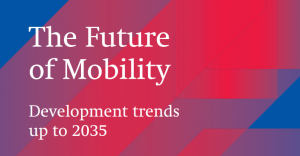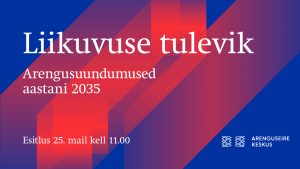In order to achieve optimal financing, students should cover 20% of the higher education expenditure, says the Foresight Centre Report “The Future of Higher Education. Development Trends until 2035”, published today, on 8 June.
News
The sustainability of Estonia’s transport system mostly depends on Tallinn and Harju County, which contribute nearly 50% of the total mileage of all the vehicles in Estonia, says the report of the Foresight Centre “The Future of Mobility. Development trends up to 2035“, which is now published in English.
Estonia boasts a higher percentage of university graduates than most Central and Eastern European countries, yet compared to other OECD members, our students work more while studying and also drop out more often, shows the Foresight Centre brief report “Higher Education in Estonia: Situation and Challenges”.
The question of funding higher education is becoming an increasingly hot topic in Estonia as the annual deficit is already exceeding EUR 100 million. Today, 1 February, the Foresight Centre is organising a webinar “Who should foot the bill for higher education?” to discuss the main trends in funding higher education in European countries.
Tomorrow, 25 May, the Foresight Centre is publishing its report “Future of Mobility. Development Trends up to 2035”, which explores the mobility of the Estonian population, and the consequent challenges on the transport system.
By 2030, the annual state budget excise revenue from petrol and diesel fuel will fall by nearly EUR 100 million as a result of the broader use of electric vehicles, says the Foresight Centre report “Future of Mobility. Development Trends up to 2035” which will be published on Tuesday.
Over the last 20 years, the use of a private car to commute between home and work has nearly doubled in Estonia, says the Foresight Centre report “Future of Mobility. Development Scenarios up to 2035” which will be published on Tuesday. Transport takes up 14% of the total expenditure of residents.
The Estonian transport system is very car-centred and the main challenge in the coming decades will be to reduce the environmental impacts relating to cars. The study “Mobility Profiles of the Residents of Estonia”, commissioned by the Foresight Centre, shows that at least one-fifth of urban dwellers would be ready to replace using a private car with more sustainable means of mobility.
The cancellation of orders that was brought along with the first wave of the corona pandemic made companies in metal and engineering industries pay greater attention to developing original products, the report “The Impact of the Virus Crisis on the Estonian Economy. Scenarios up to 2030” by the Foresight Centre reveals. The shortage of suitable labour force and the risk-proofing of working processes has also compelled the industry to seek solutions for automating their activities.
The low-interest rates embolden people to look for riskier investment opportunities, which in turn increases expectations on the risk management of financial institutions to avoid jeopardising the savings of private individuals, says the Foresight Centre report “The Impact of the Virus Crisis on the Estonian Economy. Scenarios up to 2030”. Banks have again started to fund the investments of businesses with more confidence.

 An independent think tank at the Riigikogu
An independent think tank at the Riigikogu 




 Uku Varblane
Head of Research at Foresight Centre
Uku Varblane
Head of Research at Foresight Centre